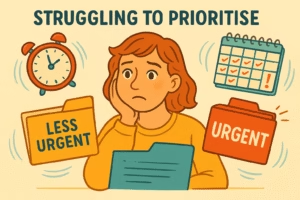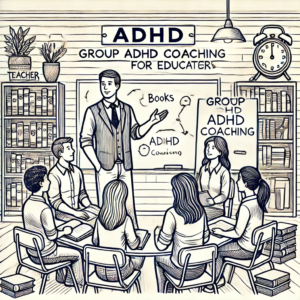Struggling with time management is a common difficulty for many adults with ADHD, and in the workplace, it can present real challenges. Being late to meetings, missing deadlines, or underestimating how long a task will take can affect both personal performance and team dynamics. But the good news? With understanding and the right strategies, these challenges can be managed effectively.

Why Time Management is Tricky with ADHD
People with ADHD often experience time differently. This phenomenon, sometimes referred to as “time blindness,” can make it difficult to gauge how long tasks take or to recognise the passage of time. ADHD UK explains that this can lead to:
- Underestimating time needed to complete work
- Difficulty starting or switching between tasks
- Becoming hyper-focused and losing track of time
At work, this might mean rushing through tasks last minute or being caught off guard by looming deadlines.
Real-Life Examples in the Workplace
Let’s say you’re assigned a report that’s due next week. You might think, “I’ve got plenty of time,” and delay getting started. But then suddenly it’s the night before the deadline, and you’re overwhelmed and under pressure. Or maybe you start preparing for a 10am meeting at 9:55, not realising you need more time to gather your notes.
These situations don’t reflect a lack of care or competence—they’re symptoms of how ADHD affects executive function and time estimation.
Strategies to Improve Time Management
The key isn’t working harder—it’s working smarter with tools and support:
1. Break tasks into smaller steps: Use planners or digital tools to map out the components of a project. Ticking off small wins helps build momentum.
2. Use visual reminders and timers: Visual clocks or apps like Time Timer can help you visualise time passing.
3. Prioritise and plan: Try planning your day the night before or first thing in the morning. Use techniques like time-blocking to set realistic windows for tasks.
4. Build in transition time: Don’t book meetings back-to-back. Give yourself buffer time to switch gears and refocus.
5. Seek support: ADHD coaching can help tailor strategies to your needs. At ADHD-Coaching.uk, we work with clients to develop routines that stick.
Creating an ADHD-Friendly Work Environment
Employers can also support employees with ADHD by:
- Offering flexible scheduling
- Providing task management tools
- Encouraging open communication
These adjustments benefit not only those with ADHD but the wider team as well.
Final Thoughts
Time management issues at work aren’t a reflection of laziness or disinterest. They’re often rooted in how ADHD affects executive functioning. With the right approaches, it’s possible to take back control of your time and thrive in your career.
For personalised strategies that work for your lifestyle, consider exploring ADHD coaching at ADHD-Coaching.uk.




